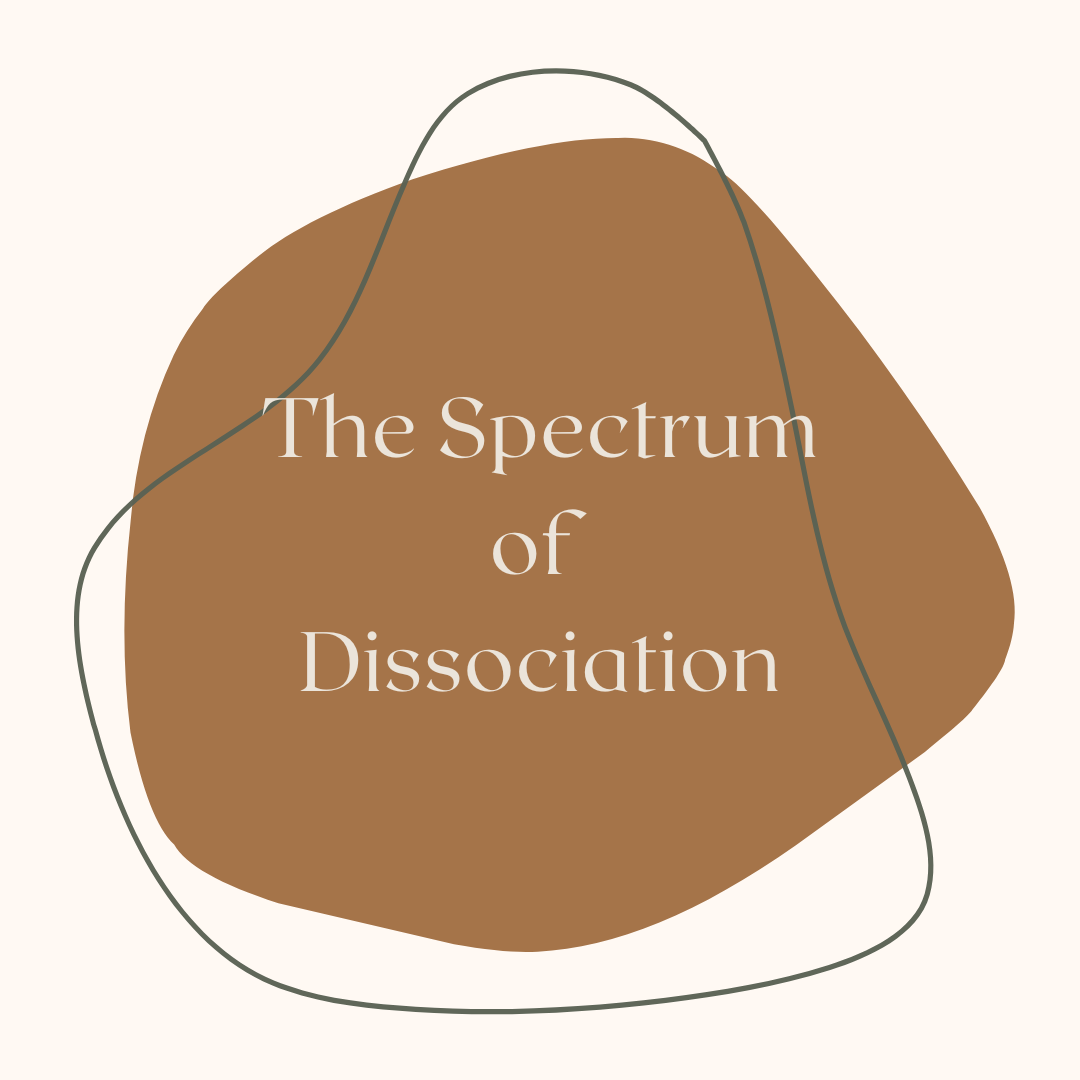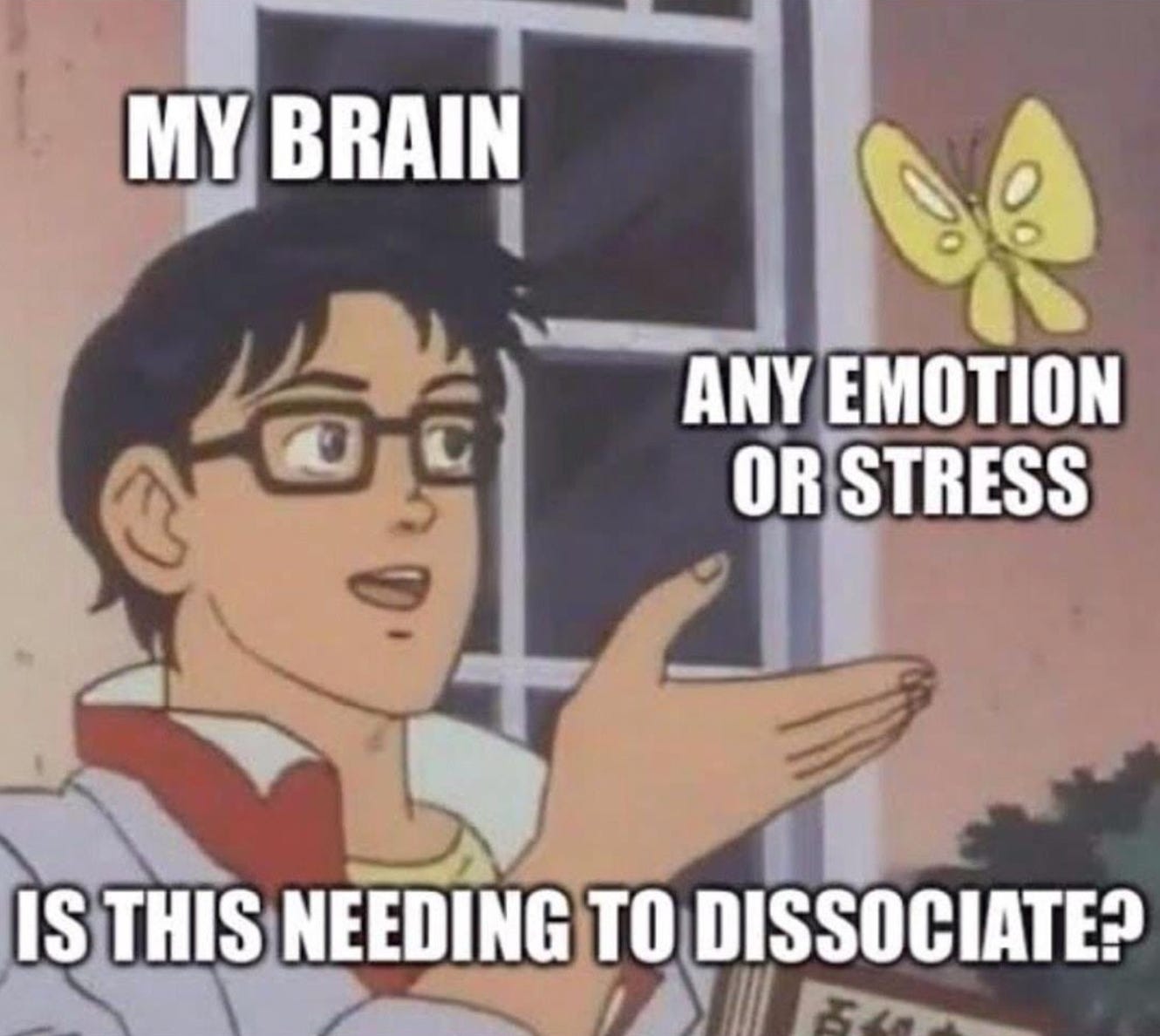You are driving on your way to work - the windows are down, your favorite podcast playing, but then something said in the podcast makes you think about a conversation you had with a friend the night before. You become lost in thought for what feels like only a moment but as you begin take in your surroundings, you realize you missed your exit 2 miles back. Your mind was somewhere else while your body was safely and efficiently driving your car. This is an example of an extremely common occurrence called dissociation.
Dissociation is a mental ability where a person disconnects from their body, thoughts, emotions, surroundings, or sense of identity. This is a process that is completely unconscious. It is important to name that dissociation exists on a spectrum - ranging from daydreaming or “highway hypnosis” (as described above in the scenario I shared about driving on the freeway) on one end of the spectrum to Post Traumatic Stress Disorder (PTSD) and Dissociative Identity Disorder (DID, formerly known as Multiple Personality Disorder).
It is common to experience small doses of dissociation - daydreaming, becoming hyper-focused on a project and lose track of time, zoning out while in conversation with someone only to realize that you missed the last few sentences that they spoke - these are all everyday occurrences of dissociating that most people can relate to.
But for some, dissociation is a way to cope in order to deal with the effects of trauma. Dissociation happens when we leave our “Window of Tolerance” and our nervous systems get pushed into hypoarousal and a state of collapse. When we cannot physically leave an unsafe or overwhelming situation, there are other ways to leave such as disconnecting from your body, thoughts, emotions, etc. There are also many situations where physically leaving is actually less safe than staying (i.e. young children who need their caregivers for survival even if there is abuse at home).
It can be extremely adaptive for a person’s brain and nervous system to utilize dissociation in an unsafe or stressful experience. This can help many folks to survive situations that they otherwise might not have been able to. But if left unchecked and unprocessed, this unconscious survival strategy of dissociating can get “stuck on”. This can result in a person dissociating much more frequently and in situations that are just reminders of traumatic experiences, not unsafe situations in and of themselves.
If you experience any level of dissociation, the following may help to ground you and bring you back into your body. As you try any of these, notice what is happening inside:
Standing or gentle movement
Rolling a tennis ball under your feet
Playing an upbeat song and jumping or dancing along
Splashing cold water on your face or taking a cold shower
Walking outside to get the mail without shoes on
Orienting to the present moment, take a look around and see if you can find three things that are a certain color. Notice three qualities about each of these things (texture, smell, shape, size, etc.)
Stand and shift your weight from your toes to your heals and then from side to side
Are there tools or activities you use to stay in your body? How do you experience dissociation? If you would like to take a screener to further self-assess how often you dissociate there are many online such as this one here.
It is nice to be back writing and sharing these newsletters! I have not written in two weeks for a few reasons - one being I was visiting friends in the Bay Area and was focusing on being present with them, the second reason is that my computer decided to call it quits and I had to get a replacement.
Reading and loving “Who is Wellness For?” which is a thought-provoking book about the wellness industry and the influences of white supremacy and capitalism that are entangled within it.
Also reading “The Politics of Trauma: Somatics, Healing, and Social Justice”. The title is pretty self-explanatory, and I highly recommend!
Listening to: this podcast discussing and exploring dissociation.
Some dear friends of mine in Oakland made a delicious meal and we spent the night chatting while making and rolling our own salmon spring rolls. I haven’t stopped thinking about that meal and cooked it for myself now that I am back in North Carolina.
May your days and week be filled with whatever you are most needing,
Ellen







Thank you for raising and educating on this vital piece of the trauma/chronic illness puzzle. Interesting that you mention getting "stuck on" - my theory of 'Idiopathic' Parkinson's is this is when the tonic immobility freeze stress response gets stuck on. One of my favourite/most useful framings of dissociation is as part of a natural defense cascade as explained in the terrific paper "DISSOCIATION FOLLOWING TRAUMATIC STRESS: ETIOLOGY AND TREATMENT," (sorry for the capital letters of the copy-paste) https://www.complextrauma.uk/uploads/2/3/9/4/23949705/dissociation_following_traumatic_stress.pdf